On International Mother Language Day 2023, Launching Pratham Books Reading Programme in Urdu on StoryWeaver!
Posted by Shristhi Patra on February 21, 2023On the occasion of International Mother Language Day, 2023, we launched our Urdu Digital Reading Programme in collaboration with UNICEF Maharashtra, State Council of Educational Research and Training, Maharashtra, and Regional Academic Authority, Aurangabad (RAA).
UNESCO reports that 40% of the world population does not have access to education in a language they speak or understand1. This year’s International Mother Language Day theme2 emphasises the importance of ‘promoting multilingualism and multilingual education’ in order to ‘foster quality, inclusive, and equitable learning’ for all.
We at Pratham Books Storyweaver are deeply committed to the vision of SDG 4: Quality Education for All, and to the path set out in India’s National Education Policy3 from Learning to Read to Reading to Learn. We firmly believe that learning to read in one’s mother tongue helps make education more engaging, meaningful, and enjoyable for children.
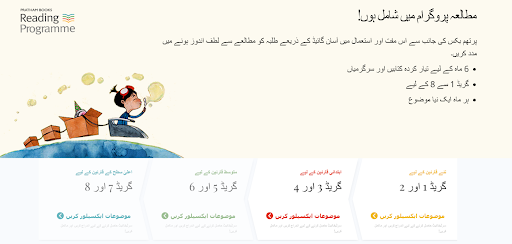
Pratham Books Reading Programme in Urdu on StoryWeaver
Pratham Books Urdu Digital Reading Programme on StoryWeaver offers open-source, high quality, digital, structured, reading resources in Urdu language to increase access to mother-language libraries and promote a culture of reading. The digital library comprises thematically diverse and grade-levelled storybooks for young learners to access freely.
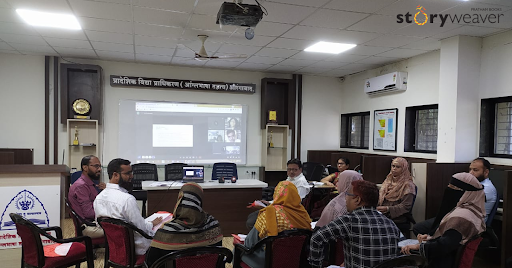
RAA Aurangabad team at Pratham Books Capacity Building Workshop
These Urdu story books have been created by the partner resource team at Regional Academic Authority, Aurangabad after participating in Pratham Books StoryWeaver's capacity building workshops. These workshops included editorial translation and review capacity building training, and training for digital translation and publishing to help create level appropriate picture book translations.
References:
[1]https://en.unesco.org/news/40-don-t-access-education-language-they-understand
[2] https://en.unesco.org/sites/default/files/imld-2023-concept-note-en.pdf
[3]https://www.education.gov.in/sites/upload_files/mhrd/files/NEP_Final_English_0.pdf
The making of 'Moonlight in the Sea' | A guest post by Kartik Shanker, Dakshin Foundation
Posted by Pallavi Kamath on January 15, 2021New on StoryWeaver:
'Moonlight in the Sea' (written by Kartik Shanker, illustrated by Prabha Mallya, and published by the Dakshin Foundation) tells the story of Fatima who lives on an idyllic island in the Lakshadweep, watched over by Nihla, the moon. It introduces young readers to the underwater world of colourful corals, fascinating fish, mysterious manta rays, grizzled old turtles and dancing dolphins.
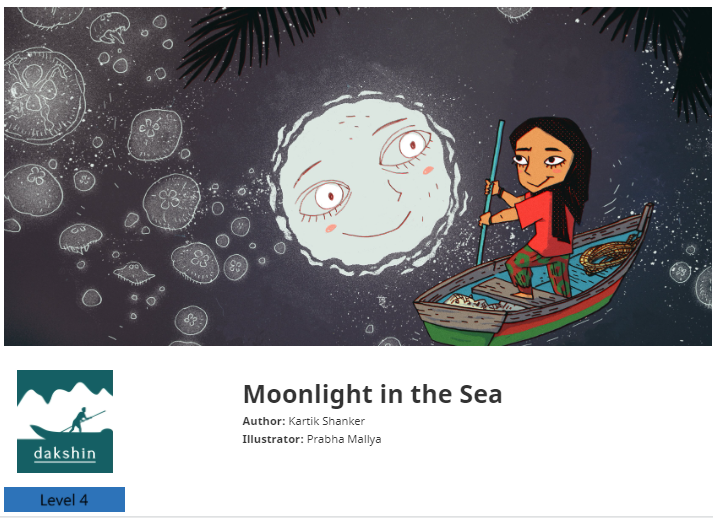
Learn more about the people and places that inspired the making of 'Moonlight in the Sea', in this blogpost by Kartik Shanker, author, ecologist, and founder trustee of the Dakshin Foundation:
As an aspiring wildlife biologist, you learn pretty early on not to expect National Geographic scenes when you visit a forest. It may take months to see your first elephant, years to see a tiger. It took me weeks of turtle walks to see my first olive ridley. But, put on a mask and a snorkel and stick your head under water at a good reef, and it looks pretty much like that last NGS show you watched.
I still remember the first time I went snorkeling in the Lakshadweep in 2001 – ‘the flurry of colour, the shock of shapes’. We were conducting sea turtle surveys there, and I spent every spare moment paddling around in the waters of the Kavaratti lagoon. A decade later, as part of Dakshin Foundation, we started a project on the tuna fishery in the islands. We monitored tuna using a participatory monitoring programme with the fishers, and one of our researchers, Mahima Jaini, conducted in-water surveys of baitfish. Around the same time, my student, Anne Theo had started her research on mixed species groups of reef fish.
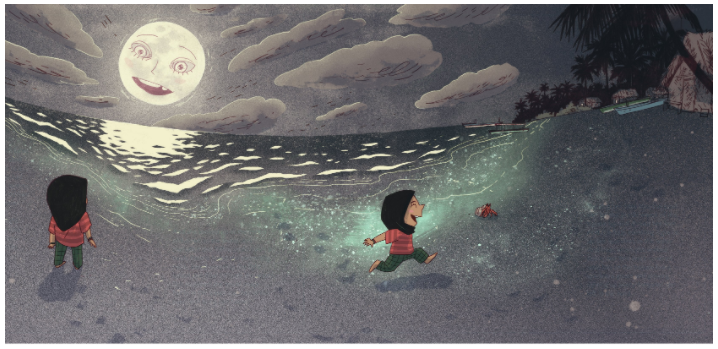
At Agatti, the two of them would use Jaffer’s fishing boat to conduct their dives. Throughout their time there, his support for their field work and dive surveys was invaluable. Jaffer looked after them as he would his family. In the evening, he and his wife would visit with their daughter Nihla, then an adorable 3-year-old. His boat was named after her, Nihla Fatima. The gentle ethos of the Lakshadweep, the still waters of the lagoons, the richness of its marine life, the solitary charm of Suheli all cried out for a story to be told.
Nihla inspired that story – about a little girl in the Lakshadweep, and the possibility that such girls could one day become marine biologists like Anne and Mahima.
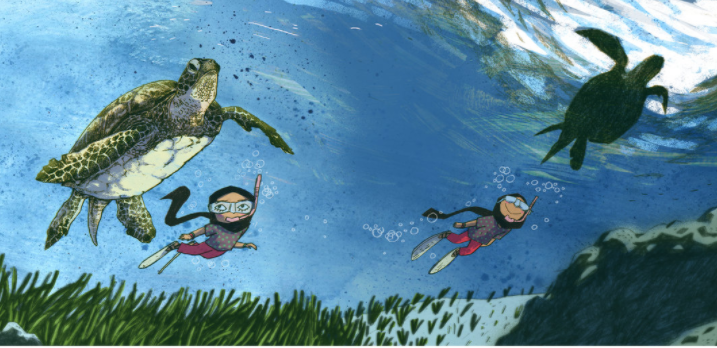
I visited them frequently – happy times were spent diving off Jaffer’s boat. One time, we dived off Bangaram, saw some sharks, and then ate the most delectable fish biryani cooked on the boat. Another time, the three of us made a trip to Suheli, an uninhabited island several hours by boat from Kavaratti. In 1979, my mentor, Satish Bhaskar, had spent 5 months there by himself during the monsoon to survey green turtles. Many of these memories found their way into the narrative.
And then Prabha Mallya made the story come alive with her amazing and evocative illustrations. In my story, Nihla, the moon was a quirky character; through Prabha’s illustrations, she became a co-star. My niece’s daughter Ariana, age 2, was heard to say ‘When I grow up, I wanna be Nihla moon!" I guess that says it all.
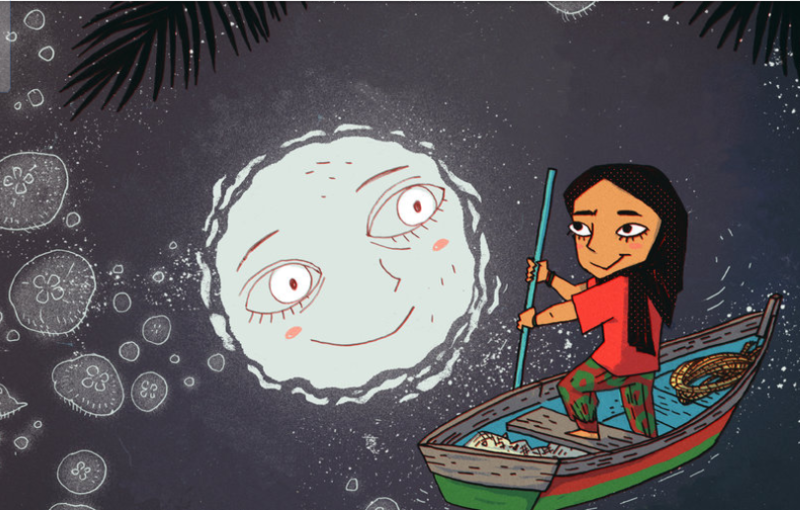
Click to read 'Moonlight in the Sea'
A big thank you, Kartik, Prabha and the Dakshin Foundation, for open licensing this wonderful book and making it available on StoryWeaver!
Illustrations in this post are by Prabha Mallya, from 'Moonlight in the Sea', written by Kartik Shanker, published by the Dakshin Foundation.
Kartik Shanker is a founder trustee of Dakshin Foundation. An ecologist by training, Kartik has interests in both mountain and marine systems. His work with marine turtles in the last 20 years has led to broader interests in coastal and marine conservation. Currently, he serves as an Associate Professor at the Centre for Ecological Sciences (CES), Indian Institute of Science (IISc.), Bangalore. In addition to academic research, he is also interested in strategies to improve environmental education and the public understanding of science. This interest encouraged Kartik to establish Current Conservation, a magazine that bridges conservation and art by bringing together research professionals, writers and artists from different parts of the world. He is the author of the book From Soup to Superstar, a historical account of sea turtle conservation in India. In his spare time, Kartik also seeks to distract young minds through children’s stories which include Lori’s Magical Mystery, Turtle Story, The Adventures of Philautus Frog, and Moonlight in the Sea.
Dakshin Foundation is a non-profit, non-governmental organisation. Their mission is to inform and advocate conservation and natural resource management, while promoting and supporting sustainable livelihoods, social development and environmental justice. They adopt interdisciplinary approaches in our research and conservation interventions, drawing from the fields of ecology, conservation biology, sociology, economics, and law. Their work aims at building community capacity for conservation and enhancing community engagement in environmental decision-making. Their goal is to promote ecologically and socially appropriate approaches to conservation and management in coastal, marine and mountain ecosystems in India.
comments (3)The Year is Ending, But Let’s Continue the Joy of Reading With Our Year End Wrap
Posted by Shristhi Patra on December 27, 2022StoryWeaver is celebrating this festive season by presenting to you our year end wrap. Come, let us soak in this holiday season by reading our most loved stories from 2022. This festive season, let us remember the joys of the year gone by and greet the new year with hope, and renewed enthusiasm. Here is a list of fun and sparkling stories to introduce to the child.
1. A Bunch of Flowers: What is happening to Peri’s mother? His mother is always sleeping, her room is always dark like a thick forest of tall trees. In this wordless book for emergent readers, Peri thinks of ways to bring the outdoors and sunshine back into their home and into his mother’s eyes. Immerse yourself in this lovely picture book on hope, support, and understanding written by Liwliwa Malabed, illustrated by Saumya Oberoi, and published by Singapore Book Council here.
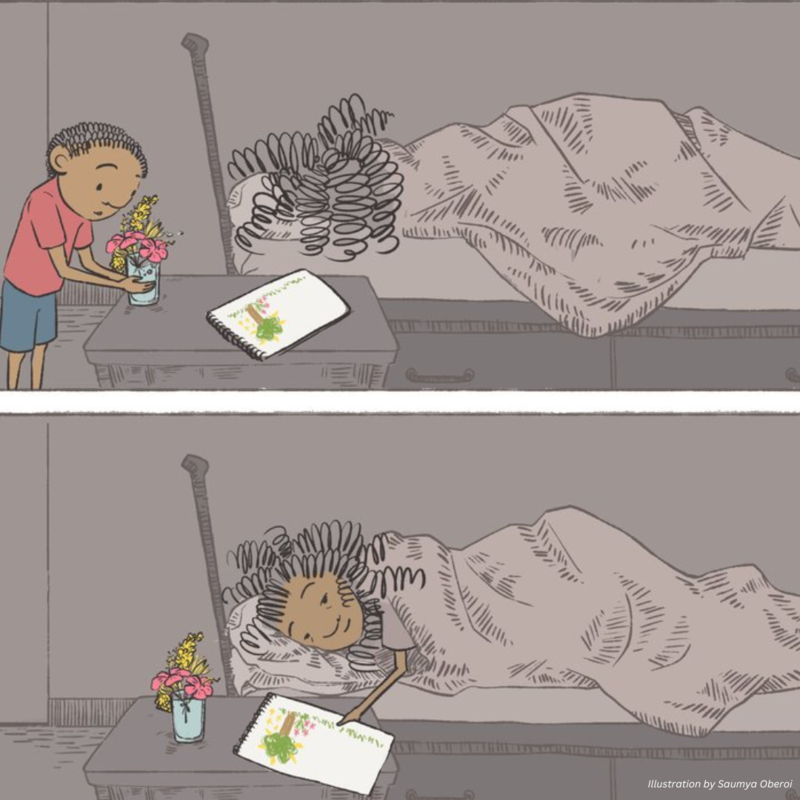
2. How Many?: Crawling snails, fluttering butterflies, pigs in the mud. This book has so many animals, and more keep joining in. Can you count them all? Count your way through complex maths concepts with this richly illustrated book written by Sudeshna Shome Ghosh, illustrated by Sayan Mukherjee, and published by Pratham Books here.
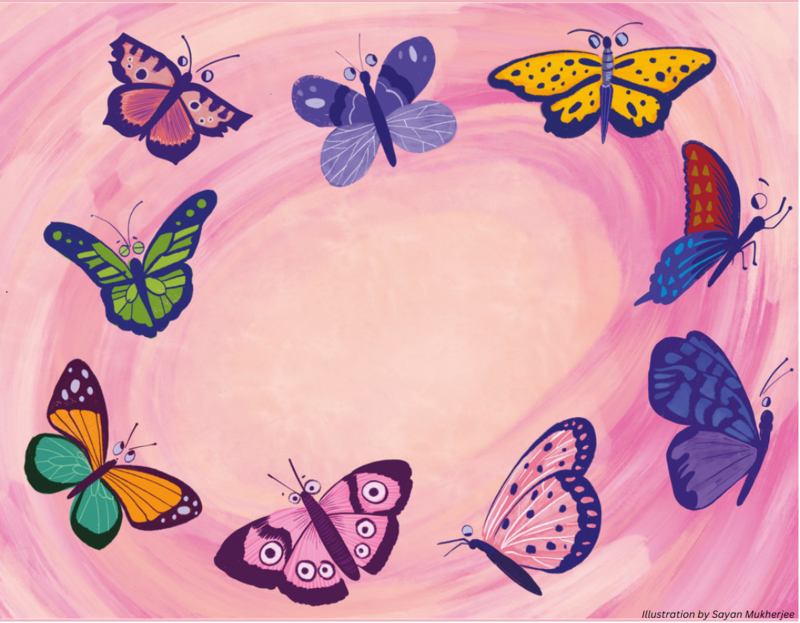
3. Brave Bora: Going to the doctor can be scary! Can Bora overcome his fears, with a little help from Baba and Jojo? Explore your own courage through this beautiful story on love and support written by Edna Gicovi, illustrated by Ellen Heydenrych, and published by Book Dash here.
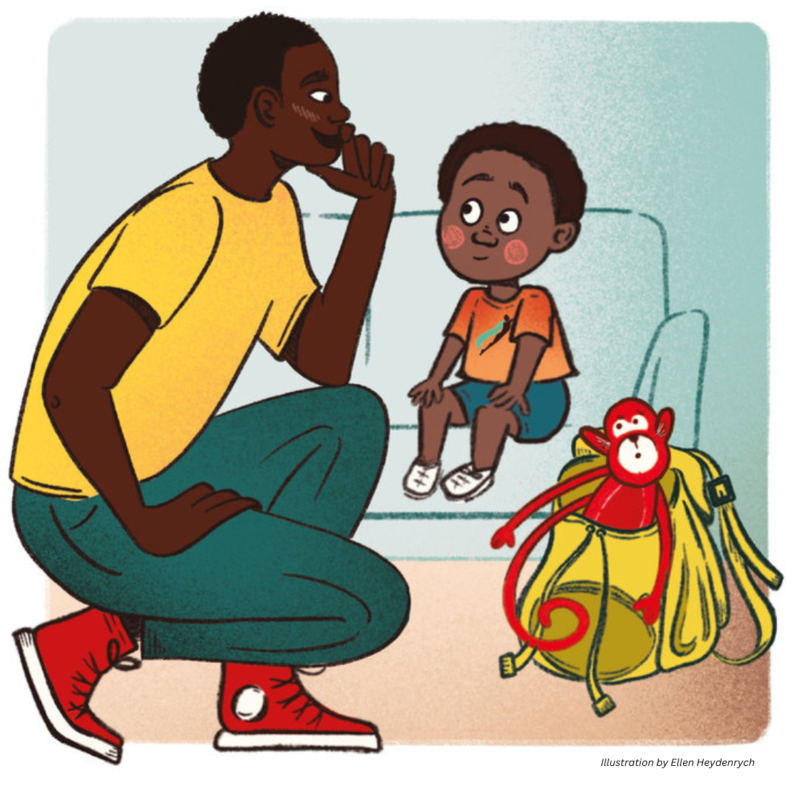
4. Haru: Meet Haru, who loves to eat, run and play. Even though there are nights when it’s hard to find a warm place to sleep, or days when there isn’t enough food to eat, Haru is always certain that tomorrow will be better. After all, as long as there is love and joy, it’s not a bad life! Discover the joy in the little things in life through this book written and illustrated by Manjari Chakravarti, and published by Pratham Books here.
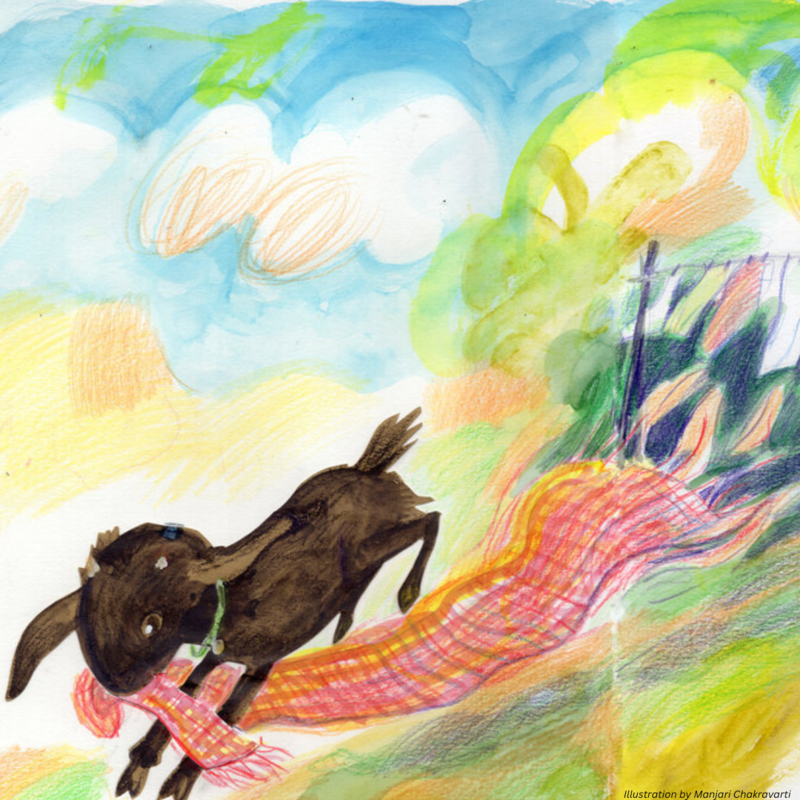
5. At Home: Ammini misses school, and her brother Unni misses his aunt. Both of them miss playing in the park. But everyone has to stay indoors. Maybe they can go out for a walk today? Ammini hopes so. A day in the life of two children in a time of lockdowns and social distancing. Join Ammini on her journey as she tries her best to keep hopeful and carry on during tough times written by Shweta Ganesh Kumar, illustrated by Annand Menon, and published by Pratham Books here.
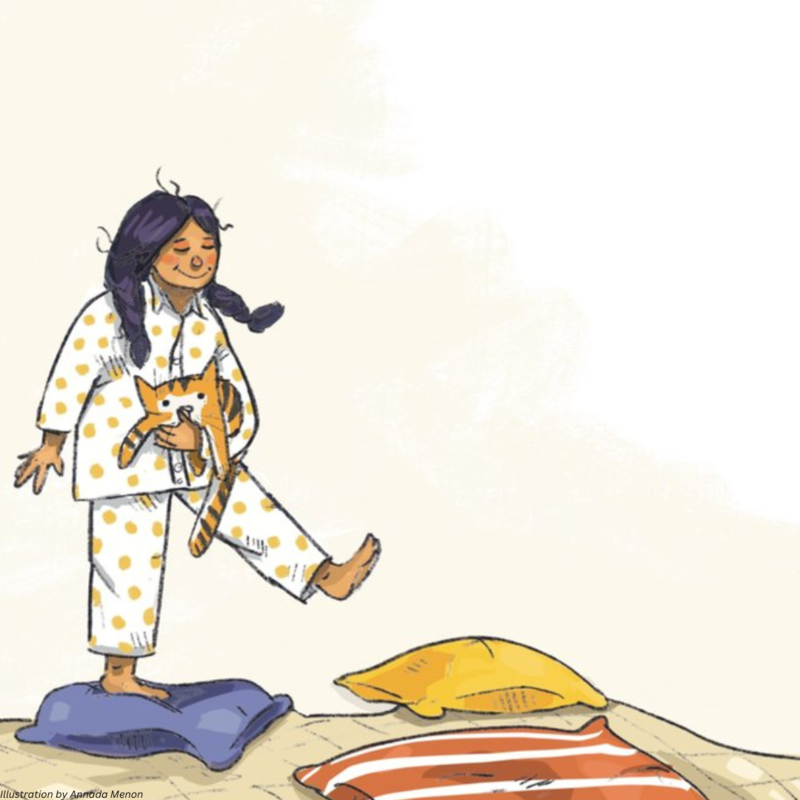
As we look back, this past year has been about recovering from the impact of the Covid-19 pandemic with the realisation that we must continue our efforts to make the joy of reading fun, free, and accessible to all. Help us continue our journey of spreading the cheer of reading. If you like our work, consider donating to StoryWeaver. No amount is too small, and we appreciate every single contribution.
To make your contribution, click on: http://bit.ly/3PHTht5
comment (1)